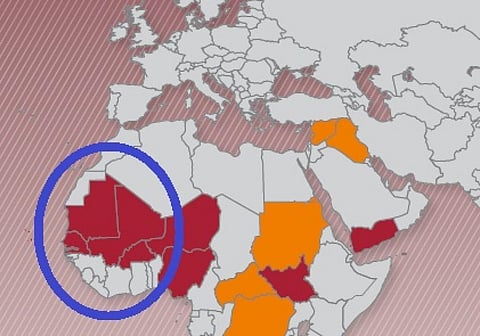

Africa, especially the countries in the western part of the continent, suffered poor and erratic rainfall in 2019 and 2020 may be worse, the Food and Agriculture Organization (FAO) warned in January.
Sparse rain spurred drought in Cape Verde, the Gambia, Mauritania and Senegal in 2019. Such countries may severe food-insecurity by June-August, according to the FAO’s Early Warning Early Action Report.
Some 1.7 million people are projected to be affected by then, more than double the 845,000 who were severely food-insecure during October-December.
In Mauritania, 73 per cent hydro-meteorological stations registered severe rainfall deficits over long-term (1981–2010) average, the FAO report noted.
The delayed and deficit rain affected agriculture. Rainfed crops suffered a 17 per cent dip over their five-year average production.
The FAO estimated that Cape Verde’s maize output would crash 80 per cent by June-August. It also projected the production of cereals and cash crops in the Gambia to be 46 and 70 per cent respectively below their five-year averages.
Pasture lands in Mauritania, especially in its west, have been affected by poor rainfall. They have declined in Senegal too in regions like Louga, Matam, Saint-Louis, Kaffrine, Kaolak and Diourbel.
Limited pasture and availability of water in several areas of Mauritania and Senegal can affect livestock and weaken the purchasing power of agro-pastoralists. Those with a limited mobility of livestock can suffer significant losses.
With a vast amount of land affected by rainfall and vegetation deficits, there is a higher risk of concentration of livestock in areas with resources. This may raise risk of diseases in animals and conflict over resources.
Since October 2019, high concentrations of animals have already been registered in Guidimakha and South-East Gorgol regions of Mauritania, and the situation is likely to worsen.
The FAO feared a spread of foot-and mouth disease (FMD) in the region, especially where the livestock was not immunised against ‘Serotype O’, a particular strain of the virus circulating widely in west and central Africa since July 2018.
The highly contagious disease in cattle, buffalo, sheep and pigs can affect milk and meat production and lead to the death of younger animals. Livestock may also be affected by the Rift Valley fever.
The FAO has suggested immediate action to mitigate the impact of drought on vulnerable pastoralists and agro pastoralists. It has sought monitoring livestock markets closely and destocking weak animals in drought-affected areas.
Providing livestock feed and water to safeguard core-breeding stock is essential. Boosting the production of fodder along river streams, pastoral wells and low-lying areas should be prioritised, the FAO said.
Animal health services, especially vaccination and de-worming should also be prioritised by the affected countries. The FAO advised governments to support off-season home-gardening in communities with access to water, as well as the cultivation of irrigated and flood receding crops.